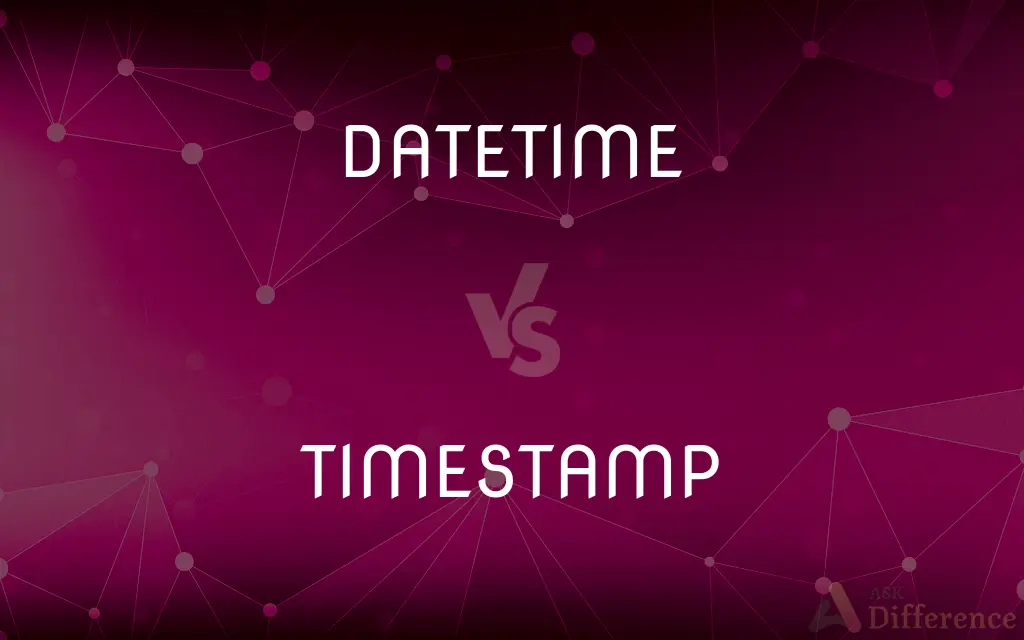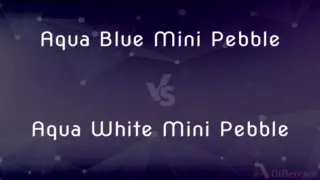DATETIME vs. TIMESTAMP — What's the Difference?
By Tayyaba Rehman — Published on January 16, 2024
DATETIME is a data type for storing dates and times independently of time zones, while TIMESTAMP represents the time relative to UTC with time zone awareness.

Difference Between DATETIME and TIMESTAMP
Table of Contents
ADVERTISEMENT
Key Differences
DATETIME is a data type in SQL databases used to store date and time information. It stores the year, month, day, hour, minute, and second, and is independent of time zone settings. TIMESTAMP, on the other hand, is designed to store the number of seconds since the Unix epoch (January 1, 1970) and is usually used to track changes to records and is sensitive to time zone settings.
DATETIME can store a broader range of dates (e.g., from the year 1000 to 9999 in MySQL) compared to TIMESTAMP, which typically has a more limited range due to its representation based on Unix time. TIMESTAMP is often used where the record of the exact time of an event, including the time zone, is critical.
In terms of storage, DATETIME typically consumes more space (e.g., 8 bytes in MySQL) compared to TIMESTAMP (e.g., 4 bytes in MySQL). This is because TIMESTAMP’s range is limited and it is encoded as the number of seconds elapsed.
DATETIME remains constant and doesn’t change if the database server's time zone setting is modified. In contrast, TIMESTAMP values are converted to the current time zone of the database server.
Usage-wise, DATETIME is better suited for values that require independence from time zones, like birthdates, whereas TIMESTAMP is preferable for values that need to reflect a universal point in time, like log timestamps.
ADVERTISEMENT
Comparison Chart
Time Zone Sensitivity
Independent of time zones.
Sensitive to time zones.
Range
Broader date range (e.g., 1000-9999 in MySQL).
Limited range based on Unix epoch time.
Storage Space
Typically larger (e.g., 8 bytes in MySQL).
Smaller (e.g., 4 bytes in MySQL).
Time Zone Conversion
Remains constant regardless of server time zone.
Converted to the server’s current time zone.
Typical Use
Dates requiring no time zone context.
Tracking changes, events in universal time.
Compare with Definitions
DATETIME
DATETIME is a SQL data type for storing specific dates and times.
The 'created_at' column in our database is a DATETIME field.
TIMESTAMP
It automatically adjusts to the time zone of the database server.
TIMESTAMP fields in our global app adjust to the server's time zone.
DATETIME
It represents a combination of date and time without time zone context.
User profiles store birthdates in a DATETIME format.
TIMESTAMP
TIMESTAMP has a narrower range compared to DATETIME.
TIMESTAMP is unsuitable for dates outside the Unix epoch range.
DATETIME
DATETIME values are unchanged regardless of server time zone.
The event's start time is stored in DATETIME, unaffected by server location.
TIMESTAMP
TIMESTAMP is a data type for storing dates and times as the number of seconds since the Unix epoch.
The 'last_updated' field in our system is a TIMESTAMP.
DATETIME
It is suitable for storing dates and times in a broad range.
Historical events are recorded in the database using DATETIME.
TIMESTAMP
TIMESTAMP is typically used for recording events in universal time.
Log entries are timestamped to track changes accurately.
DATETIME
DATETIME consumes more storage space for its broader range.
Due to its size, we use DATETIME sparingly for essential date-time data only.
TIMESTAMP
It offers a more compact storage solution for date and time data.
We use TIMESTAMP for efficiently storing transaction times.
DATETIME
(programming) A variable or data type that can hold both date and time components.
TIMESTAMP
(computing) A variable containing the date and time at which an event occurred, often included in a log to track the sequence of events.
TIMESTAMP
To record the date and time of (an event, etc).
Common Curiosities
Is TIMESTAMP affected by changes in the server's time zone?
Yes, TIMESTAMP values are converted based on the server's current time zone.
Why would you use TIMESTAMP over DATETIME?
TIMESTAMP is used when you need to record the exact time of an event with time zone awareness, like log entries.
Which is larger in storage size, DATETIME or TIMESTAMP?
DATETIME typically consumes more storage space than TIMESTAMP.
Can DATETIME values change with time zone adjustments?
No, DATETIME values remain constant regardless of time zone adjustments.
What is the range of dates that TIMESTAMP can store?
TIMESTAMP usually stores dates from 1970 to 2038, based on the 32-bit Unix time.
Is it possible to disable time zone conversions for TIMESTAMP?
Generally, no. TIMESTAMP is designed to be time zone aware in most database systems.
Is TIMESTAMP used for tracking record modifications?
Yes, TIMESTAMP is commonly used to track when a record was last modified.
What is the main use of DATETIME?
DATETIME is primarily used to store specific date and time information without regard to time zone changes.
Can DATETIME store historical dates like 1800?
Yes, DATETIME can store a wide range of dates, including historical dates like 1800.
Do DATETIME values change when the database is moved to a different server?
No, DATETIME values stay the same regardless of the server's location or time zone.
Which data type should I use for audit logging?
TIMESTAMP is typically used for audit logging to record events in universal time.
How does daylight saving time affect TIMESTAMP?
TIMESTAMP values adjust automatically for daylight saving time based on the server's time zone settings.
Are TIMESTAMP values the same across different databases?
TIMESTAMP values can differ across databases if the servers are in different time zones.
Should I use DATETIME or TIMESTAMP for birthdates?
DATETIME is preferable for birthdates, as they do not require time zone context.
Can I store future dates in TIMESTAMP?
Yes, as long as they fall within the Unix epoch range (up to 2038 in a 32-bit system).
Share Your Discovery

Previous Comparison
Aqua Blue Mini Pebble vs. Aqua White Mini Pebble
Next Comparison
Hindu Dharma vs. Sanatana DharmaAuthor Spotlight
Written by
Tayyaba RehmanTayyaba Rehman is a distinguished writer, currently serving as a primary contributor to askdifference.com. As a researcher in semantics and etymology, Tayyaba's passion for the complexity of languages and their distinctions has found a perfect home on the platform. Tayyaba delves into the intricacies of language, distinguishing between commonly confused words and phrases, thereby providing clarity for readers worldwide.














































